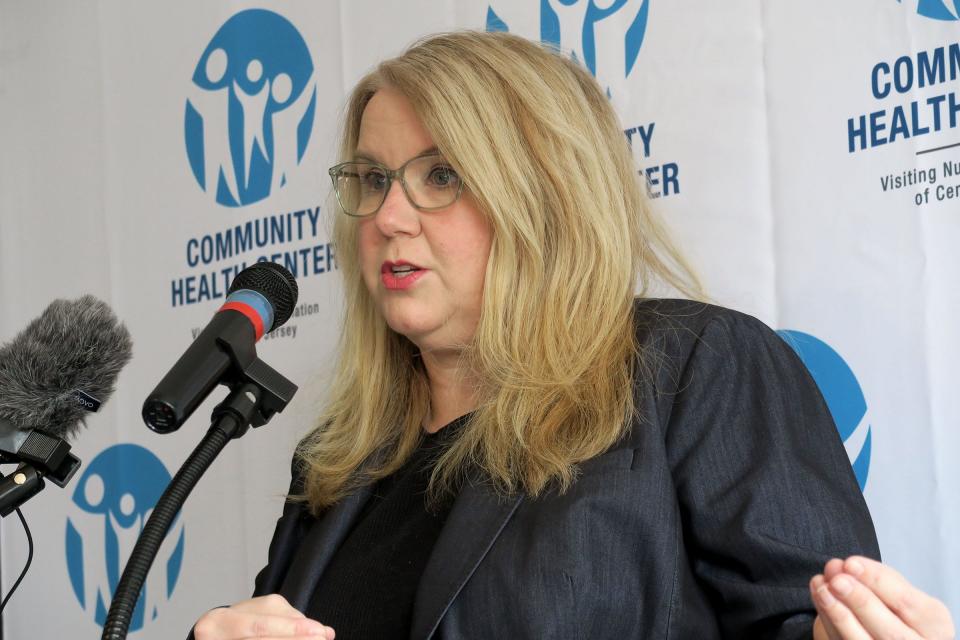Mental illness is the leading cause of pregnancy-related deaths. What's being done
It started with a fitness group.
The Hispanic American Association of Delaware was searching for a way to support mothers in the local community. They knew that many of these women were dealing with the typical stressors of parenthood on top of the difficulties that many Hispanic people in the Wilmington area confront, like language barriers and distance from families in South and Latin America.
To address that need, Hispanic American Association of Delaware Executive President Ronaldo Tello said the association held informal focus groups with mothers in the community. Many of these women expressed experiencing postpartum depression — an issue that affects 1 in 8 new mothers, according to the Office on Women’s Health.
Mental health issues are also the leading cause of pregnancy-related deaths in the U.S., according to the Centers for Disease Control and Prevention. This includes deaths by suicide and drug overdoses.

As a certified mental health therapist, Tello recognized the need to address maternal mental illness. And so, after receiving community input, the Hispanic American Association of Delaware decided to host a free fitness dance group set to Latin music.
It was a way to not only empower mothers and tackle mental health issues, but also to address physical health problems like diabetes that affect many Latina women.
Maternal mental health in the Hispanic community
The Hispanic American Association of Delaware runs another program geared toward new mothers called Mamás Felices, Hijos Felices — Happy Mothers, Happy Children in English. It expanded the association’s approach to mental health by providing mental health counseling and screenings, Spanish support groups, and connections to resources to more than 300 pregnant women and new mothers.
Tello said many of these women are unlikely to seek help from larger nonprofits or the state, whether due to language barriers or a lack of trust. However, when they are faced with an organization based in their own neighborhood, they are more likely to get the help they need.
Mamás Felices, Hijos Felices was initially funded by a grant geared toward reducing infant and maternal mortality and addressing disparities. The mini-grant was awarded by the Delaware Healthy Mother and Infant Consortium, which has undertaken efforts of its own to improve maternal mental health across the state.
The Delaware Healthy Mother and Infant Consortium
Consortium Chair Dr. Priscilla Mpasi said Delaware has seen a rise in mental health issues and substance abuse among birthing persons in recent years. She said nearly half of all pregnancy-associated deaths in Delaware had a co-occurrence of mental health or substance use disorder as a contributing factor between 2018 and 2022, underscoring the need for intervention and resources.
At the same time, 4 out of 5 pregnancy-related deaths are preventable, according to the CDC.

“We have to address the barriers to get women and birthing persons into care,” Mpasi said.
Many of these barriers are the same ones that make it more difficult for people to access mental health care in general, like cost, lack of access to transportation and stigma, especially in the Black community.
But for birthing persons, Mpasi said there’s an added element of shame and fear. Some worry that they may lose custody of their child or be viewed as a “bad mom,” Mpasi said. It’s why the state is focusing many of its efforts at the community level.
“Birthing persons really can connect to those that are on a similar journey,” Mpasi said.
So if another parent shares their experience with mental health issues and treatment, others may be more likely to seek help themselves.
“We want birthing persons to be at their best to be able to support the child's development to help them grow and thrive,” Mpasi said. “And that starts with taking care of yourself physically, mentally and emotionally.”
Addressing maternal mental health at the national level
The Health Resources and Services Administration launched the National Maternal Mental Health Hotline on Mother’s Day in 2022.
Since then, the hotline has received more than 33,000 calls from pregnant and postpartum people and their loved ones, Health Resources and Services Administration Administrator Carole Johnson said.
Most of these callers contacted the hotline for depression, anxiety and feeling overwhelmed.

“Being a new parent is hard,” Johnson said. “Being pregnant is hard. Unfortunately, there's still way too much stigma around mental health conditions…and asking for help. Our hotline provides a safe space for people to do that.”
The administration is working to spread the word about the hotline through partnerships with hospitals and fliers at places in the community where people tend to congregate, like laundromats and libraries.
“If you've given it a thought and you're like ‘that might be helpful to me,’ pick up the phone and call or text us,” Johnson said. “We are here to help.”
The Health Resources and Services Administration stresses that this hotline is not a crisis line. Anyone experiencing a mental health crisis should call 988 or 911.
Reducing disparities in health outcomes
The hotline is not the only initiative addressing maternal mental health that the Health Resources and Services Administration is undertaking.
Johnson said the federal government is funding increased efforts to provide better mental health training to obstetricians, midwives and doulas. Many of these professionals have not had formal training on how to recognize signs of mental illness and what resources the pregnant and postpartum people should be connected with.
With this training and better access to treatment comes another necessity: diverse, culturally-aligned and inclusive mental health therapists.
“Every Delawarean should have the opportunity for health and wellness regardless of (their) racial or ethnic background,” Mpasi said.
Mpasi said one of the Delaware Healthy Mother and Infant Consortium's primary focuses is decreasing racial disparities in maternal and infant health outcomes. But in order to do so, the social determinants of health — which include health care access and quality, education, safety and economic stability — must be addressed.
Oftentimes, this means changing models of care to fit the needs of those most impacted.
Mpasi said the consortium is looking into co-locating therapists with primary care providers and obstetricians, bringing therapy into the community, offering services in multiple languages, hiring diverse therapists and increasing education with birthing parents.
“It can sound cliche, but they're truly not alone,” Mpasi said. “Experiencing mental health symptoms or having a mental health condition is common, and it's treatable. We want to be able to provide the best care and treatment as early as possible … so that person can live a life that's normal for them.”
Maternal Mental Health Hotline: call or text 833-852-6262
Suicide and Crisis Lifeline: call or text 988
Send story tips or ideas to Hannah Edelman at hedelman@delawareonline.com. For more reporting, follow them on X at @h_edelman.
This article originally appeared on Delaware News Journal: Maternal mental health focus of state committee, local organizations

